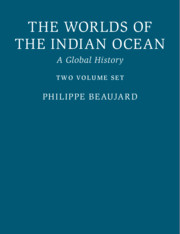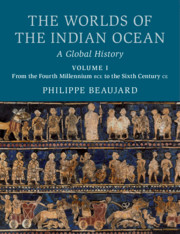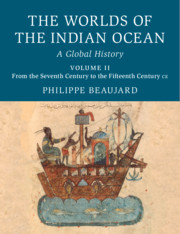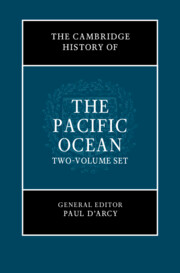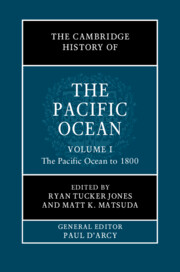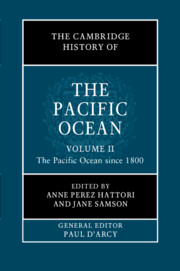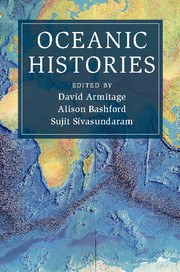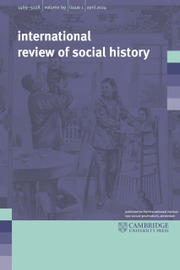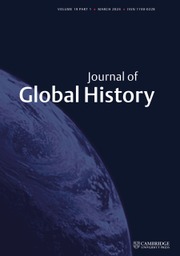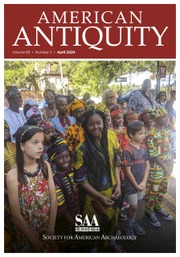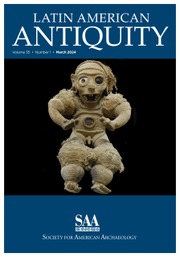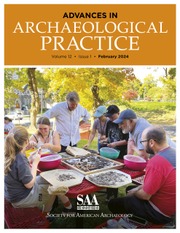The Worlds of the Indian Ocean
A Global History
£175.00
- Author: Philippe Beaujard, Centre National de la Recherche Scientifique (CNRS), Paris
- Date Published: October 2019
- availability: In stock
- format: Multiple copy pack
- isbn: 9781108341271
£
175.00
Multiple copy pack
Looking for an inspection copy?
This title is not currently available on inspection
-
Europe's place in history is re-assessed in this first comprehensive history of the ancient world, centering on the Indian Ocean and its role in pre-modern globalization. Philippe Beaujard presents an ambitious and comprehensive global history of the Indian Ocean world, from the earliest state formations to 1500 CE. Supported by a wealth of empirical data, full-color maps, plates, and figures, he shows how Asia and Africa dominated the economic and cultural landscape and the flow of ideas in the pre-modern world. This led to a trans-regional division of labor and an Afro-Eurasian world economy. Beaujard questions the origins of capitalism and hints at how this world-system may evolve in the future. The result is a re-orienting of world history, taking the Indian Ocean, rather than Europe, as the point of departure.
Read more- Thoroughly revised and updated by the author for the first English-language edition, including a wide range of full-color maps and plates
- Offers a new model for the world-system approach by examining the possibility that globalization processes existed in ancient world economies
- Re-assesses Braudel's approach and Wallerstein's theory for regions outside Europe prior to the sixteenth century
Reviews & endorsements
'… an ambitious and thoroughly comprehensive book … It will be a standard reference volume for many generations of anthropologists, archaeologists, economic historians and classicists interested in the deep history of the Indian Ocean.' Chapurukha M. Kusimba, Azania: Archaeological Research in Africa
Customer reviews
Not yet reviewed
Be the first to review
Review was not posted due to profanity
×Product details
- Date Published: October 2019
- format: Multiple copy pack
- isbn: 9781108341271
- length: 2100 pages
- dimensions: 310 x 235 x 205 mm
- weight: 6.5kg
- availability: In stock
Table of Contents
Volume 1. Prologue: the geography of the Indian Ocean and the navigation
Part I. The Ancient Routes of Trade and Cultural Exchanges and the First States (6th–2nd Millenia BC): Introduction
1. The birth of the state
2. Early Bronze Age I in Western Asia and in Egypt (ca. 3000–2700 BC)
3. Early Bronze Age II (ca. 2700–1950 BC)
4. The new spaces of the Middle Bronze Age in Asia and in Egypt (ca. 2000–1750 BC)
5. The Late Bronze Age (ca. 1600–1100 BC), an area unified around the Eastern Mediterranean
6. East Asia. From villages to states (ca. 5000–1027 BC)
7. The emergence of intermediary spaces
Conclusion: were there world-systems during the Bronze Age?
Part II. The Birth of the Afro-Eurasian World-System (1st Millennium BC–1st Century AD): Introduction
8. The beginnings of the Iron Age
9. The roads to the Orient
10. India. The birth of a new core
11. Southeast Asia, an interface between two Oceans
12. China. From Kingdoms to Unification
13. Arabia. Maritime cultures and the rise of the caravan trade
14. East Africa: the emergence of a pre-Swahili culture on the Azanian Coast
15. The Austronesian expansion and the first Malagasy cultures. Volume 2. Part I. The Indian Ocean between Tang China and the Muslim Empire (7th Through 10th Centuries)
Introduction
1. Tang China and the rise of the Silk Roads
2. Islam. The conquest of lands and oceans
3. India. A core with four centers
4. Southeast Asia. The rise of the Sriwijayan Thalassocracy and the Javanese Kingdoms
5. East Africa. Dawn of the Swahili culture
6. Madagascar (7th Through 11th Centuries). Early Cultural Métissages
Part II. Globalization during the Song and Mongol Periods (10th–14th centuries), and the downturn of the 14th century
Introduction
7. China. The golden age of the song, the Mongol conquest and the Ming revival
8. India: from the Chola Empire to the Delhi sultanate
9. Southeast Asia. From the decline of Sriwijaya to the rise of Mojopahit
10. Central and Western Asia. From the Seljuk Empire to the Ilkhanids
11. Egypt and Yemen. The Jewish and Karimi networks
12. East Africa. The rise of the Swahili culture and the expansion of Islam
13. Madagascar. The development of trading ports and the interior
Part III. From the Globalization of the Afro-Eurasian Area to the Dawn of European Expansion (15th and Early 16th Centuries)
Introduction
14. Ming China, from expansion to withdrawal into threatened territory
15. India. The flowering of the sultanates and the expansion of Vijayanâgara
16. Southeast Asia: era of the merchant sultanates
17 Western Asia: revival of the Persian Gulf
18. Egypt and Yemen. Advances in state trade and the end of the Karimi
19. East Africa and the Comoros
20. Madagascar (15th–16th centuries): the rise of trading ports and development of the Highlands
21. The Portuguese in the Indian Ocean
Epilogue.
Sorry, this resource is locked
Please register or sign in to request access. If you are having problems accessing these resources please email [email protected]
Register Sign in» Proceed
You are now leaving the Cambridge University Press website. Your eBook purchase and download will be completed by our partner www.ebooks.com. Please see the permission section of the www.ebooks.com catalogue page for details of the print & copy limits on our eBooks.
Continue ×Are you sure you want to delete your account?
This cannot be undone.
Thank you for your feedback which will help us improve our service.
If you requested a response, we will make sure to get back to you shortly.
×
